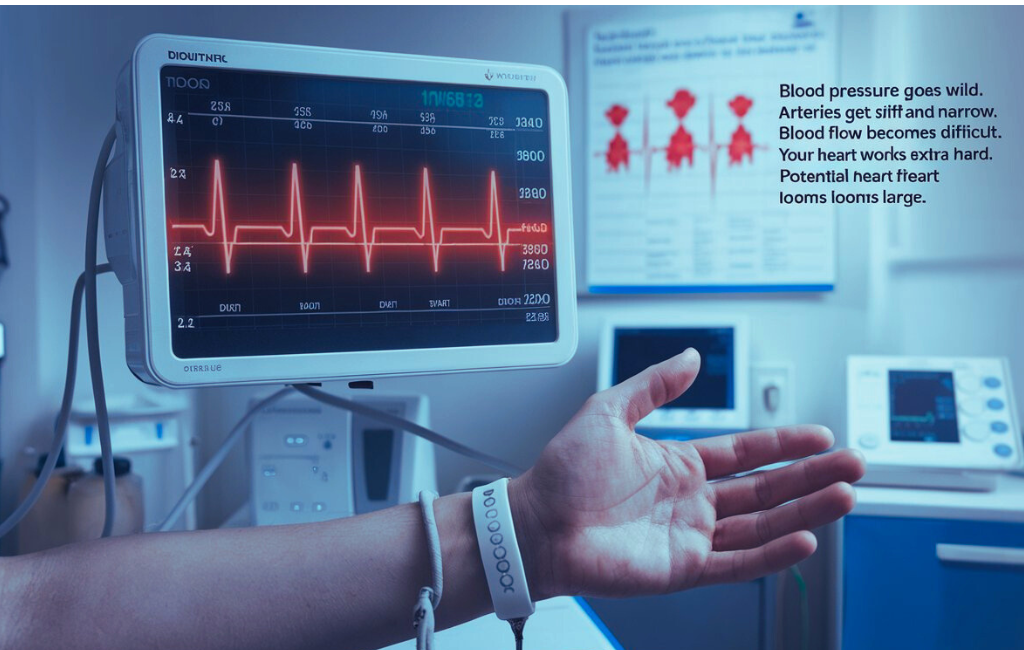Hypertension, often known as high blood pressure, is a significant health issue affecting millions worldwide. It is called the “silent killer” because it usually shows no symptoms until severe damage is done. Let’s delve into why hypertension is a global health threat and how it connects to mental health.
Understanding Hypertension
Hypertension occurs when the force of the blood against artery walls is too high. This condition can lead to severe health problems, including heart disease, stroke, and kidney failure. Blood pressure is measured in millimeters of mercury (mm Hg) and is recorded with two numbers: systolic and diastolic pressures. Normal blood pressure is below 120/80 mm Hg.
Causes of Hypertension
Several factors contribute to hypertension:
- Unhealthy Diet: High intake of salt, fat, and cholesterol can raise blood pressure.
- Lack of Physical Activity: Sedentary lifestyle increases the risk of hypertension.
- Obesity: Excess weight makes the heart work harder, increasing blood pressure.
- Genetics: Family history can play a role.
- Stress: Chronic stress can lead to temporary increases in blood pressure.
- Alcohol and Tobacco Use: Both can damage the heart and blood vessels.
Impact on Physical Health
Hypertension affects many parts of the body:
- Heart: It can lead to heart attacks, heart failure, and aneurysms.
- Brain: High blood pressure can cause strokes and cognitive impairment.
- Kidneys: It can lead to kidney failure or damage.
- Eyes: Hypertension can cause vision loss due to damage to blood vessels in the retina.
Connection Between Hypertension and Mental Health
Mental health and hypertension are closely linked. Chronic stress, anxiety, and depression can contribute to high blood pressure. Conversely, hypertension can lead to mental health issues due to the stress of managing a chronic condition. This creates a vicious cycle that affects overall well-being.
Preventing Hypertension
Prevention is key to managing hypertension. Here are some tips:
- Healthy Diet: Eat plenty of fruits, vegetables, and whole grains. Limit salt and unhealthy fats.
- Regular Exercise: Aim for at least 30 minutes of moderate exercise most days of the week.
- Maintain a Healthy Weight: Losing even a small amount of weight can help reduce blood pressure.
- Limit Alcohol: Drink in moderation.
- Quit Smoking: Tobacco raises blood pressure and damages blood vessel walls.
- Manage Stress: Practice relaxation techniques like yoga, meditation, or deep breathing exercises.
Managing Hypertension
If you have hypertension, it’s crucial to manage it effectively:
- Medication: Take prescribed medications regularly.
- Monitor Blood Pressure: Regularly check your blood pressure at home.
- Regular Check-ups: Visit your doctor for regular check-ups.
- Healthy Lifestyle: Continue following a healthy diet, exercise regularly, and avoid smoking and excessive drinking.
Lifestyle Changes for Managing Hypertension
Adopting healthy habits is essential in managing hypertension effectively. Here are additional lifestyle tips:
- Balanced Diet: Incorporate lean proteins, whole grains, and low-fat dairy into your meals.
- Sodium Intake: Reduce salt consumption by avoiding processed foods and reading food labels.
- Physical Activity: Engage in activities you enjoy, such as walking, cycling, or swimming.
- Weight Management: Aim for a healthy weight through a combination of diet and exercise.
- Limit Caffeine: Caffeine can temporarily raise blood pressure, so moderate your intake.
- Stay Hydrated: Drink plenty of water throughout the day.
The Role of Mental Health in Hypertension Management
Addressing mental health is crucial in managing hypertension. Stress, anxiety, and depression can elevate blood pressure. Here’s how you can take care of your mental health:
- Therapy: Seek professional help if you’re experiencing chronic stress or anxiety.
- Mindfulness: Practice mindfulness and meditation to reduce stress.
- Support System: Lean on friends and family for emotional support.
- Healthy Sleep: Aim for 7-9 hours of quality sleep each night.
- Hobbies: Engage in activities that bring you joy and relaxation.
Monitoring Blood Pressure at Home
Keeping track of your blood pressure at home can help you manage hypertension effectively. Here are some tips for accurate monitoring:
- Use a Reliable Monitor: Choose a validated blood pressure monitor for accurate readings.
- Measure Regularly: Take readings at the same time each day, preferably in the morning and evening.
- Sit Correctly: Sit with your back straight and supported, feet flat on the floor.
- Stay Calm: Rest for 5 minutes before taking a reading to ensure accuracy.
- Track Readings: Keep a log of your readings to share with your doctor.
Conclusion
Hypertension is a silent threat that can lead to severe health problems if left unchecked. Understanding its causes, impact, and connection to mental health is crucial for prevention and management. By adopting a healthy lifestyle and managing stress, you can control your blood pressure and improve your overall well-being. Stay informed, stay healthy, and take proactive steps to combat hypertension.
FAQ
Q: What is hypertension?
A: Hypertension, or high blood pressure, occurs when the force of the blood against artery walls is too high.
Q: What causes hypertension?
A: Causes include unhealthy diet, lack of physical activity, obesity, genetics, stress, and use of alcohol and tobacco.
Q: How does hypertension affect physical health?
A: It can lead to heart disease, stroke, kidney failure, and vision loss.
Q: What is the connection between hypertension and mental health?
A: Chronic stress, anxiety, and depression can contribute to hypertension, and managing hypertension can lead to mental health issues.
Q: How can I prevent hypertension?
A: Maintain a healthy diet, exercise regularly, maintain a healthy weight, limit alcohol, quit smoking, and manage stress.
Q: How can I manage hypertension?
A: Take prescribed medications, monitor blood pressure, have regular check-ups, and follow a healthy lifestyle.
Q: How does diet affect hypertension?
A: A healthy diet rich in fruits, vegetables, and low-fat dairy can help manage blood pressure. Reducing salt and unhealthy fats is also essential.
Q: Why is regular exercise important for hypertension?
A: Exercise strengthens the heart, improves blood flow, and helps maintain a healthy weight, all of which can lower blood pressure.
Q: Can mental health issues lead to hypertension?
A: Yes, chronic stress, anxiety, and depression can raise blood pressure, highlighting the need for mental health care in hypertension management.
By understanding the significance of hypertension and taking steps to prevent and manage it, you can protect your health and well-being. Regular monitoring and a proactive approach are essential in combating this silent threat. Stay vigilant and make healthy lifestyle choices to keep hypertension at bay.








